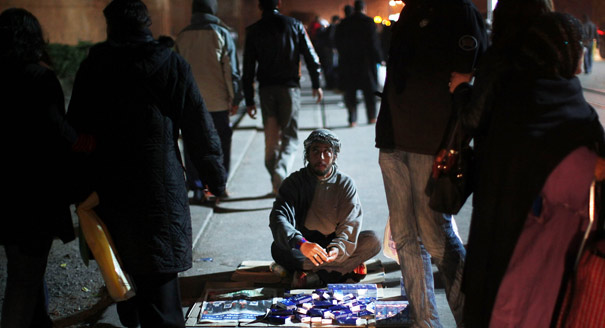Registration
You will receive an email confirming your registration.
Arab economies are plagued by unemployment, informal unprotected work, and income disparities. Policymakers need to set the conditions to create productive and inclusive societies and lift the region out of poverty. A new report by the International Labor Organization (ILO), the United Nations Development Program (UNDP), and the United Nations Economic and Social Commission for Western Asia (ESCWA) show that meager economic outcomes in the Arab world over the last two decades are due to poor governance and bad policies. The report examines their implications for economic growth and income distribution in the region and provides new insights on how to address them.
The Carnegie Middle East Center, ILO, and UNDP, in collaboration with the Moroccan National Institute of Statistics and Applied Economics, organized a workshop in Rabat to present and discuss the report from a Moroccan perspective. Carnegie’s Lahcen Achy moderated the session.
Main Findings
Mary Kawar, senior economist at the ILO Regional Office for Arab Countries in Beirut, began the discussion by highlighting the report’s findings:
- Improvement of Main Indicators: Economic reforms implemented two decades ago have succeeded in yielding “relatively better” macroeconomic indicators, she said. The region witnessed a reduction of public debt, inflation remained under control, and poverty was reduced in accordance with the Millennium Development Goals.
- Misleading Numbers: Most investments targeted sectors which demand low-skill, low-productivity, and low-wage jobs, such as textiles and construction, she continued. Growth in these sectors has resulted in a decrease in unemployment rates. However, the unemployment indicator alone does not speak to the quality of jobs created. Indeed, Arab economies are largely dependent on labor intensive industries and agriculture. Considering the vast improvement in access to education throughout the region, she added, the demand for low-skill jobs is mismatched with the emergence of a young and educated labor force which seems overqualified for the available openings.
- Informal Sector and Emigration: States have poured public money into subsidies instead of supporting productive activities and building strong diversified economies. The rentier state model, which assured the provision of jobs through the public sector, has not been a sustainable model, she stated. Struggling citizens have turned to working in the precarious informal sector or have opted to leave their country.
- Deteriorating Social Realities: Policymakers have focused on market reforms while preserving the privileges of their allies and overlooked the underlying social realities, she warned. Real wage levels have deteriorated for the past twenty years and governments have been unable to sustain subsidies on primary goods. The fact that the International Monetary Fund had been lauding Egypt and Tunisia’s economic performances shortly before the uprisings is a prime example of this discrepancy, she pointed out.
- Weak Safety Nets: Only a small proportion of Arab citizens benefit from safety nets, she said. This is a direct result of the public under provision of key of social services such as health and education.
Evolving Realities: A Failing Social Contract
Lahcen Achy, Abdelhak Allalat, director at the High Planning Commission (HPC), Attouch Hicham, president of the Morocco’s Economic Forum and Mohamed Harakat, president of Strategic Studies and Governance Center, discussed the report approach and findings and provided their perspectives on how the political landscape has been shaping the economy in the Arab region:
- Changing Labor Market Dynamics: A serious transformation is needed in order to move to a skills-based industrial economy, Allalat said. However, the prevalent rentier system poses institutional obstacles to a change in the demand for labor. High demographic growth and improved education have created a generation with higher expectations for employment and freedom of expression. The previous social contract is difficult to maintain in an era of growing budget deficit and the public sector’s inability to absorb new entrants to the labor force, Achy highlighted.
- Bad Governance: The lack of transparency means there is virtually no separation between the public and private sectors, Attouch added. In countries where corruption is rampant, private businesses thrive on privileges bestowed by the government rather than productivity. For example, the business communities in Egypt and Tunisia had close ties with the ruling elite, Harakat noticed. The failing social contract has hindered the development of a proper economic model. In most cases, the leadership failed to have a vision and properly reform institutions to enhance growth and economic diversification, Achy underlined. Sectors with high added value have been paralyzed by the regimes in place.
Policy and Research Recommendations
Arab states will face future economic growth rates that fall below levels required to reduce unemployment as their populations both grow and age. The requirement for economic growth will not be satisfied unless macroeconomic and governance conditions improve to attract much higher rates of investment and address structural and institutional issues that were not addressed by past reforms. Participants offered several recommendations for moving forward:
- Reform Differently: The Arab countries should continue with reforms but reforms different from those introduced in the past.
- Keep Policy Coherence: Reform should lead to better outcomes in terms of productivity gains and economic diversification and increases income level across social strata.
- Increase Voice and Accountability: Arab countries need to improve their governance through social dialogue that increases citizens’ voice and government accountability.
- Broaden Social Protection: Arab governments must reform their social spending to pull risks across the whole population and enhance human development and social prosperity.
